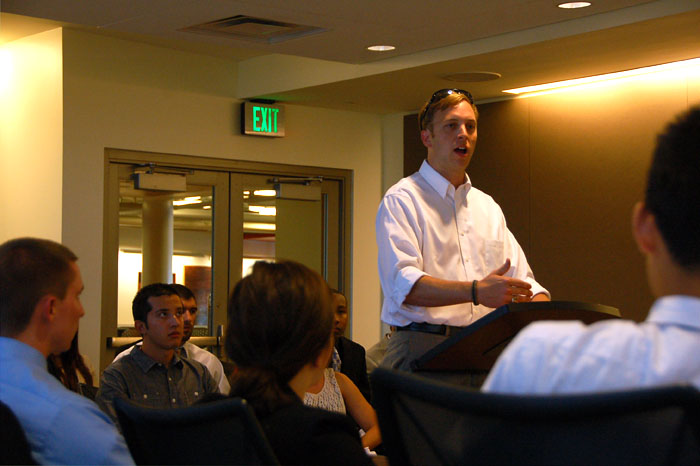Veterans ‘not feeling the love’
Tobias Slaton, President of the ASWSU Student Veterans Committee asks the ASWSU Senate for help in solving problems for incoming veteran students in the CUB, Wednesday, Sept. 11.
September 12, 2013
Easing the transition from military life to the college environment for student veterans highlighted yesterday’s ASWSU Senate agenda.
Numerous veterans attested to the difficulties they have encountered while acclimating to the WSU campus and suggested changes to make Alive! orientation sessions more welcoming to post-military service personnel.
“Right now, I’m not feeling the love,” said Tobias Slaton, ASWSU veteran’s committee president, quoting freshman veteran Marc Marcus, who could not attend the meeting.
The rest of Marcus’ statement detailed his initial exposure to the life of a student at WSU.
Marcus’ Alive! group consisted entirely of veterans. He said his orientation counselor seemed out of place, uncomfortable, lacked military knowledge, and could not go into detail about the resources available to student veterans.
Members of the veteran’s committee advocated for improved guidance during Alive! sessions.
All-Campus Sen. Taylor Penny said she plans to become an Alive! orientation counselor. She said she would do whatever it takes to ensure student veterans are provided with appropriate facilities.
“I feel like it’s important to have a veteran whether it’s a volunteer or paid orientation counselor to be at all the Alive! sessions so the veterans who’ve been accepted to the school have knowledge of someone here who understands,” Penny said.
She said orientation counselors should be instructed on how to interact with veterans and facilitate their smooth transition into a college lifestyle.
“Maybe two veterans for half a summer each at every Alive! session so that veterans who are incoming students whether they are transfers or freshmen are in that group,” she said.
Courtney Hall-Mullen, student veteran’s committee secretary, served in the Marine Corps.
“When I first came here, I was terrified of entering a university setting full of people who would never truly understand me,” Hall-Mullen said. “My experiences in the military shaped and altered me in a way that people without that experience can’t truly comprehend.”
Hall-Mullen participated in a veteran’s transition course at Alive!, but the course did not elicit what services are available to veterans, she said.
“The biggest nightmare of them all was dealing with the GI bill and financial aid,” Hall-Mullen said. “Every day I waited in line at the financial aid office to ask questions pertaining to the process of getting money for books, tuition payments, etc.”
Hall-Mullen said she became upset with The Office of Financial Aid when funds from her GI bill were not processed on time. She said she lost hope for success when she could not pay for tuition, textbooks and other required materials.
“I spent five years in the military so I could get an education without immersing myself in tens of thousands of dollars in debt,” she said.
Slaton stressed the importance of a WSU veteran’s center and improvements to the Alive! experience. He said he hopes to make WSU and Pullman a veteran-friendly place.
“These are small fixes we can address,” Slaton said. “They affect the entire student body. They affect dependents. They affect 18 year olds and 31 year olds. It doesn’t matter what age you are. It’s tough.”









